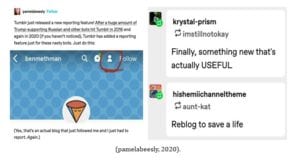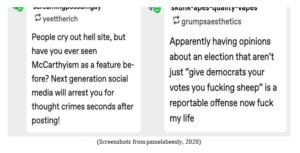
In May 2017, former FBI director Robert Mueller was appointed as special counsel to lead an investigation into allegations that Russia interfered with, and possibly influenced, the outcome of the 2016 U.S. presidential election of Donald Trump. Almost two years later in March 2019, Mueller submitted his findings to Attorney General William Bar in a report which documented Russian cyber-meddling on multiple fronts, including: probing state voter databases for insecurities, hacking the DNC and RNC, and hacking the individual campaigns of Hillary Clinton and Marco Rubio (Abrams, 2019). More subtle influence efforts included the creation of propaganda ‘troll farms’ (networks of fake accounts) by the Russian Internet Research Agency (IRA) that could disseminate false, disparaging, and divisive messages on social media aimed at sowing mistrust among Americans (Abrams, 2019).
One social media website caught up in such activities was Tumblr, a microblogging platform populated by users who discuss a variety of subjects ranging from anime to social justice. Once news of IRA activity on Facebook was disclosed in 2017, Tumblr conducted its own internal investigation and “uncovered 84 accounts determined to be associated with the IRA” (Tumblr Staff, 2018). Unlike spambots, these blogs were run by real people who interacted with millions of genuine Tumblr users and posted politically divisive content that was particularly targeted at African-Americans, such as links to stories of police brutality (Mueller, 2019). As Michael Kan describes:
These blogs looked like many other politically-themed pages on social media: Designed to take advantage of Americans’ divisions, to get engagement by stoking outrage. The accounts offered critical takes on Hillary Clinton, local police, and white people via memes, animated GIFs, and shared tweets written in English – leaving little reason to suspect the content came from Russia (Kan, 2018).
In response to these findings, Tumblr issued an official statement that the company “notified law enforcement, terminated the accounts, and deleted their original posts,” as well as emailed users who had interacted with the fake accounts, began a public record of usernames associated with the IRA, and provided guidelines for users to help stop the dissemination of propaganda by checking sources and publicly correcting inaccurate information (Tumblr Staff, 2018). But was this move an ethical one?
Many Tumblr users say yes: They were glad to have been notified of the issue and commended the site for taking concrete action to quell foreign interference in American political culture, especially since some of these posts were later revealed as false. For example, in 2016 a now-deleted blog posted a series of disturbing GIFs which supposedly depicted the assault of a Black teenager by a white NYPD officer. However, though the footage was indeed real, the attack actually happened in South Africa, not the U.S. (Silverman, 2018).
Worried that the same interference efforts might be made again in the upcoming 2020 election, the blogging platform has also recently added a new feature to the website which allows users themselves to put Tumblr’s guidelines to the test and help reveal suspicious activity. In addition to the usual reasons one might report another user for, such as “copyright violation” or “spam,” users now have the option to submit another blog for review based on dangers to “election integrity” described as promoting content “designed to suppress, intimidate, or confuse voters or U.S. census participants [including] spreading false information about how to vote, when to vote, or where to vote” (Tumblr, 2020). Many accounts immediately praised this update, helped to spread the word to other users, and began reporting other accounts under the new categorization. The screenshots below are an example of one user showing their followers how to report for election integrity (cropped for space) and positive comments found on the post.
However, other Tumblr users were skeptical of the company’s motives and thought deleting the 84 blogs without notice was unethical. Many were concerned about Tumblr’s lack of transparency concerning how the supposed ‘Russian psyop’ accounts were identified as such because the platform only vaguely described them as “determined to be associated with the IRA” (Tumblr Staff, 2018). Without any specific explanations, some users believe that the deletion of (some of) these blogs was really just a ploy to silence Black activists. One user commented:
Tumblr isn’t being transparent about how they determined these affiliations. All it said was that it ‘worked with the justice department’ which has a well-earned reputation for shutting down dissenters (littlebifurious, 2020).
Most of the content promoted by these blogs was oriented around social justice for Black Americans – What is so wrong about that? Critics would maintain that the information was calculated to drive Americans further apart, or to endanger our democratic processes in other ways. But even if some of the information posted was false, it is impossible to know if that was done with malicious intent or by mistakenly re-sharing fake news. Furthermore, even if these accounts were Russian, Americans themselves can (and do) post politically divisive content and may even have bad intentions in doing so. Would these accounts be exempt from deletion? One could ask, where in Tumblr’s usage policy does it forbid being Russian, working for a state agency, or even discussing political matters outside of your home country? In our increasingly globalized world, commenting on the politics of other states isn’t an uncommon occurrence, especially on Tumblr where international conversation is common.
Already suspicious of the site’s intentions behind deleting the accounts, skeptical Tumblr users were also apprehensive about the new “election integrity” report feature, arguing that it can easily be misused to censor anyone critical of electoral politics or Democratic candidate Joe Biden. These critics claim that abusing this feature to discount dissenters as “Russian psyops” is especially likely to disproportionately affect Black leftists on the website, an accusation that has some historical precedents, such as the FBI’s Counter Intelligence Program (COINTELPRO) infiltration of the Black Panthers in the 1960s. Just as the above pictured post received positive comments, it also received negative ones such as:
Though no one is suggesting that Mueller’s report was falsified or Russia did not attempt to interfere in the 2016 presidential election, there is tremendous disagreement regarding whether posting intense political content on social media should even be considered meddling in the same sense as obvious hacking attacks on political institutions and voter databases. On Tumblr specifically, this debate only intensifies when ethical considerations of the site’s and users’ roles and responsibilities appear. With another heated election coming up in 2020, some on the blogging platform fear that the Russian IRA will once again attempt to interfere with American politics through social media propaganda, while others worry that such fear-mongering will lead to a red scare mob mentality that silences anyone with an opinion outside of the mainstream. In the end, as each side criticizes the other for not exercising proper critical thinking, the 2020 election discourse on Tumblr.com is sure to be interesting.
Discussion Questions:
- What are the central values at stake in this case? As a private company, does Tumblr owe its users any guarantee to free speech or access to specific information pertaining to their investigation process? Why or why not?
- What responsibility (if any) do you think Tumblr or its users have in quelling foreign interference in American political culture? Does this only apply during election season or all the time?
- Is manipulative posting always factually false? Could a post be divisive without being misinformation, and could misinformation be false but helpful for some social goal?
- What is foreign meddling in the U.S. election? How can we determine this without labelling or censoring the wrong users?
- How ought social media users speak and post about the politics or events in other countries? What ethical guidelines should direct our activities or commentary? Does it matter if our speech is motivated by money, political goals, or simply the need to speak our mind?
Further Information:
Abrams, A. (2019, April 18). “Here’s What We Know So Far About Russia’s 2016 Meddling.” TIME. Available at: https://time.com/5565991/russia-influence-2016-election/
Kan, M. (2018, March 23). “Tumblr Links 84 Fake Accounts to Russian Propaganda Campaign.” PC Magazine. Available At: https://www.pcmag.com/news/tumblr-links-84-fake-accounts-to-russian-propaganda-campaign
Littlebifurious. (2020). Available at: https://cyrodiil-burns.tumblr.com/post/172184263671/list-of-woke-blogs-that-tumblr-has-confirmed-as
Mueller, R. (2019, March). https://www.intelligence.senate.gov/sites/default/files/documents/Report_Volume2.pdf
pamelabeesly (2020). [Original post deleted.] Available at: https://www.tumblr.com/blog/view/aha266/625774734442889216
Silverman, C. (2018, February 6). “Russian Trolls Ran Wild On Tumblr And The Company Refuses To Say Anything About It.” Buzzfeed. Available at: https://www.buzzfeednews.com/article/craigsilverman/russian-trolls-ran-wild-on-tumblr-and-the-company-refuses#.wgRo0wX5oN
Tumblr Staff. (2018, March 23). Available at: https://staff.tumblr.com/post/172170432865/were-taking-steps-to-protect-against-future
Tumblr. (2020). Available at: https://www.tumblr.com/abuse/election-integrity
Authors:
Kat Williams & Scott R. Stroud, Ph.D.
Media Ethics Initiative
Center for Media Engagement
University of Texas at Austin
October 20, 2020
Tumblr Image: pixy.org / CC BY-NC-ND 4.0
This case study is supported by funding from the John S. and James L. Knight Foundation. It can be used in unmodified PDF form for classroom or educational settings. For use in publications such as textbooks, readers, and other works, please contact the Center for Media Engagement.
Ethics Case Study © 2020 by Center for Media Engagement is licensed under CC BY-NC-SA 4.0




